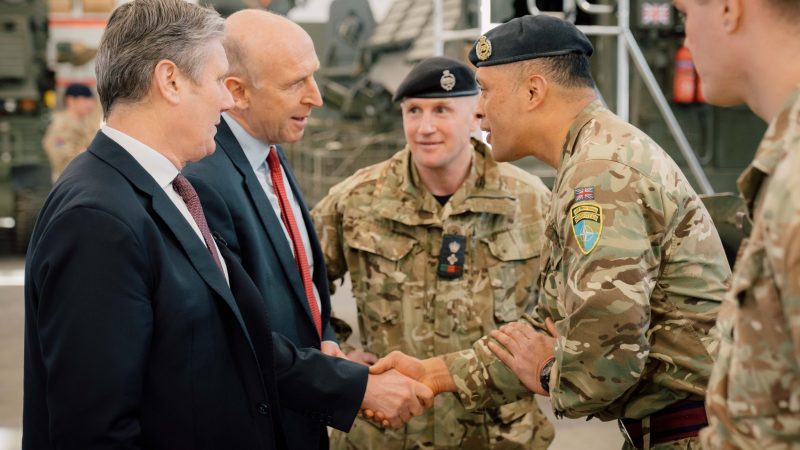
It is fair to say that few incoming Labour Prime Ministers have inherited more challenges in delivering what some say is the first task of government – to defend the nation – than Keir Starmer should he become Prime Minister this year.
A new report in The Telegraph suggesting the Chancellor may respond to the warming up of the New Cold War by freezing the MoD’s funding in next week’s Budget will make the task even harder.
Budgets have never been lower. From 1969 until 1988, including the period of the Labour governments of Harold Wilson and Jim Callaghan, the UK spent between 4% and 5% of GDP a year on defence. This fell at the end of the Cold War, but was maintained around 2.5% by the last Labour government. Severe cuts from 2010 meant that it fell to as low as 2.17% in 2014, before rebounding slightly as more money had to be allocated – primarily following Putin’s invasion of Ukraine.
This has had real impacts on the ground. The Ministry of Defence faces thousands of unfilled civilian posts thanks a to a recruitment freeze. Our armed forces are the smallest they have been in modern history. Warships are laid up because of a lack of crew and the Royal Navy has fewer escorts than at any point in living memory. Simultaneously, the Army still plans to reduce the number of main battle tanks it can field and the RAF will cut Typhoon numbers, among many other recent or planned cuts.
Capability gaps are wide and widening, from the Navy’s destroyers sent to sea with a large gym rather than land attack missiles, to a lack of comprehensive air defence for the UK.
Unfortunately, the next government faces an increasingly volatile and dangerous world. The Royal Navy under attack in the Red Sea, an intractable situation in Ukraine and increasingly bellicose rhetoric from China towards Taiwan. At the same time, there are huge risks from a possible second Donald Trump government in the USA, with repeated comments on NATO that come as no surprise but are no less shocking for it.
The long years of the Cold War showed that when faced with tyrants, deterrence does work in maintaining peace. As historian Max Hastings recently put it in The Times: “The great lesson of history, and especially of Cold War One, as we have learnt to call it, is that it was NATO’s preparedness to fight which enabled the democracies ultimately to prevail.”
However, the damage done by a decade and a half of spending cuts and chaotic leadership can be seen in the scars across all our public services.
If it takes office later this year, Labour will be faced with a long line of important services, long starved of investment. Many will rightly argue that investment cannot wait in a great many public services, neglected by the current government. Most who rally to the progressive cause want to make the world a more peaceful place, not arm for war.
There is a compelling argument that “the first duty of government is defence of the realm”. Without security, the state cannot deliver the other vital improvements so desperately needed in people’s lives. So, we see that out of the ruins of the Second World War came Labour Prime Minister Clement Attlee’s government, and with it William Beveridge’s welfare state, the NHS, thousands of council houses and so much more.
But in 2024, for an incoming Labour government, defence is about ‘first principles’ and rebuilding the UK’s manufacturing base. Defence spending can be used to improve the nation’s productivity, and invest in some of the areas hardest hit by decline.
This is because defence jobs are not generally located in London, or even in the nation’s big cities – they are in Devonport, Barrow, along the Clyde and Forth, and in countless other small communities up and down the country. Places that otherwise struggle to generate well-paying, highly skilled and unionised jobs.
These are jobs that provide digital and data skills, but also ones that produce welders, fabricators and precision engineers: precisely the skill set, usually learned vocationally, that has been badly eroded when we compare our productivity to other economies. Jobs that can make sure everyone has a chance to get on, not just the privileged few.
Shadow Defence Secretary John Healey MP has been a strong proponent of these arguments, holding the government to account when it sent vital shipyard work on the Fleet Solid Support Ships overseas. He is also right to plan a proper comprehensive review of UK capabilities.
As a union, this means we are striving to solve some of the problems the defence sector faces. In the last couple of months, I have stood on picket lines outside AWE Aldermaston fighting for better pay and we are balloting for action over pay at Defence Equipment and Support. And we will continue to call out the leadership of the MOD for their complacent attitude towards tackling sexual harassment in the department and industry.
But despite all of this it is vital to invest, and if the Conservatives abdicate this responsibility, the Opposition should make clear it would step up. Labour under Keir Starmer has been right to put security, both at home and abroad, at the centre of its pitch to the electorate. If Starmer does become Prime Minister this year, he will need to face head on a difficult inheritance at home and a volatile situation abroad.
The stakes could not be higher. But if handled in the right way, he can deliver on both national and economic security, something which voters in future will surely commend him for.




More from LabourList
The cost of living crisis is still Britain’s defining political challenge
‘Nurses are finally getting the recognition they deserve’
Letters to the Editor – week ending 15th February 2026